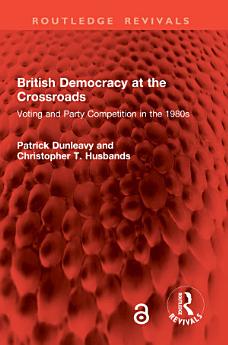British Democracy at the Crossroads: Voting and Party Competition in the 1980s
About this ebook
Therefore, a book which maintains that a major turning point in British politics has been reached is not, in itself, particularly rare. What sets British Democracy at the Crossroads (originally published in 1985) apart, however, is the breadth and depth of its analysis. It breaks the mould of conventional political science by marrying a study of voting in the 1983 election (using a specially commissioned survey) with a detailed presentation of the context in which the election took place, including analyses of the dynamics of political parties, of the role of the news media before and during the campaign, and other important issues.
This markedly different approach to the subject allows the book to serve two valuable functions. It provides a clear and concise introduction to the various methods of electoral analysis, which will be welcomed in the classroom and lecture theatre. Also, by drawing on modern political theory, it develops a distinctive radical perspective on the interconnected themes of party competition and electoral behaviour, contesting many of the assumptions that underlie the orthodox accounts of electoral dealignment. This is a challenging and stimulating book that no one with an interest in the future of democracy in Britain can afford to ignore.
About the author
Patrick Dunleavy is Emeritus Professor of Political Science and Public Policy at LSE. He is the Editor-in-Chief for LSE Press since autumn 2020. Dunleavy is a (founding) fellow of the Academy of Social Sciences, and a Fellow of the British Academy.
Christopher T. Husbands is Emeritus Reader in Sociology at LSE. He has carried out a considerable amount of research on racist political parties in several countries of western Europe and an assemblage of his articles on this subject covering the period from 1990 to 2008 was published in 2020 by Routledge in its series, Routledge Studies in Fascism and the Far Right.






